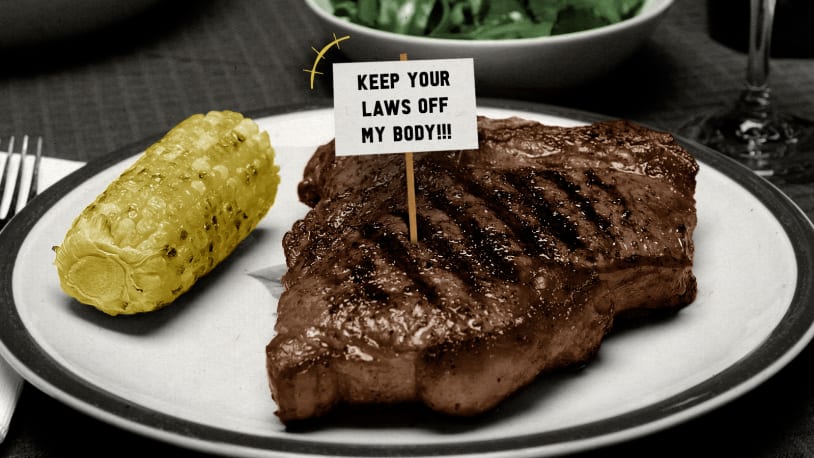
Should Supreme Court justices accept protesters as part of the job?
Supreme Court Justice Brett Kavanaugh found himself embroiled in controversy yet again after a group of pro-choice protesters crashed his Wednesday night dinner at Washington, D.C.’s Morton’s Steakhouse, where they demanded Kavanaugh be kicked out for voting to overturn Roe v. Wade. Though he stayed to finish his meal, the justice then reportedly left through the back without ordering dessert. The steakhouse later defended Kavanaugh, writing that politics “should not trample the freedom at play of the right to congregate and eat dinner. There is a time and place for everything.”
When asked about the incident, White House Press Secretary Karine Jean-Pierre condemned any tactics of intimidation and violence, but said the Biden administration supports the right to peaceful protest. And Transportation Secretary Pete Buttigieg recently said officials like Kavanaugh “should expect” these kinds of interactions. Morton’s, meanwhile, is dealing with a deluge of fake reservations and phone calls since issuing its initial statement. Here’s a quick look at how a few prominent thought leaders are parsing the confrontation.
There’s no ‘right’ to eat a meal
In two rather tongue-in-cheek columns for The New Republic and The Washington Post, Matt Ford and Alexandra Petri, respectively, argued that the Constitution does not safeguard one’s “right” (as flagged by Morton’s) to a peaceful dinner.
“Is there actually a constitutional right to dinner?” Ford cheekily wrote. “Or, more specifically, did the Constitution protect a right to dinner at the time that the Constitution was adopted?” Considering the court’s recent guns and abortion rulings, it seems “originalism is the only proper method to answer these questions.”
“My own originalist analysis of this issue leads me to conclude that no such right to dinner exists in our legal heritage. Accordingly, I do not think such a right should be recognized now,” he continued.
Kavanaugh might want “his old freedom back,” or long for someone to “escort him through the gantlet of protesters who want him to feel bad about his choices, which after all don’t affect anyone other than millions of people whose lives are going to be fundamentally changed,” Petri added in her own piece. But unfortunately, she continued, “there is no right, however seemingly basic, that cannot vanish away like a ghostly mist the second someone remembers that there might be a medieval text, somewhere, out there that disagrees.”
More Supreme Court protection, now
The harassment at Morton’s further underscores the need for increased security for justices and their families, even beyond the Supreme Court security expansion bill that lawmakers passed last month, mused The Wall Street Journal Editorial Board. “Washington is crazytown these days,” the board wrote, and the Senate’s first “order of business” following its return from a two-week recess “should be passing legislation that funds security to protect the Justices’ families.”
But still, will this latest incident — which also arrives after an armed man arrested outside Kavanaugh’s home was charged with attempted murder — “finally be enough to get Congress to act”?
Kavanaugh still has a different right
In a relevant column published hours before the Morton’s encounter, the Post‘s Deputy Editorial Page Editor Ruth Marcus contended that “even conservative justices have right to privacy” and that the protests outside their homes are “beyond the pale,” she went on.
“I’m heartsick — I’m furious — over the conservative majority’s brute force move to do away with a half-century of reproductive freedom and precedent. My sympathies are with the protesters.” But such pickets, which Marcus notes have primarily targeted Kavanaugh, are “unnecessary,” she argued. “Maybe making justices’ lives miserable will make people feel better, but it won’t accomplish anything beyond that.”
Further, “it should be possible to find ways to express justified outrage at the conservative justices without terrorizing them and their families,” she continued. “Can we not at least manage that?”
Boundaries are just different now
Restaurants “used to be reliable safe havens for Official Washington types,” Jessica Sidman wrote for The Washingtonian, but all that changed during the Trump presidency, “when the administration’s controversial policies and heated rhetoric turned dining establishments into yet another political battleground.” Certain social norms and respectability politics went out the window, and, for better or for worse, “the boundaries of time and place aren’t the same anymore,” Sidman added, alluding to a line from Morton’s statement. “This form of political protest isn’t going away anytime soon,” she said.
Supreme Court Justice Brett Kavanaugh found himself embroiled in controversy yet again after a group of pro-choice protesters crashed his Wednesday night dinner at Washington, D.C.’s Morton’s Steakhouse, where they demanded Kavanaugh be kicked out for voting to overturn Roe v. Wade. Though he stayed to finish his meal, the justice then reportedly left through…
Supreme Court Justice Brett Kavanaugh found himself embroiled in controversy yet again after a group of pro-choice protesters crashed his Wednesday night dinner at Washington, D.C.’s Morton’s Steakhouse, where they demanded Kavanaugh be kicked out for voting to overturn Roe v. Wade. Though he stayed to finish his meal, the justice then reportedly left through…